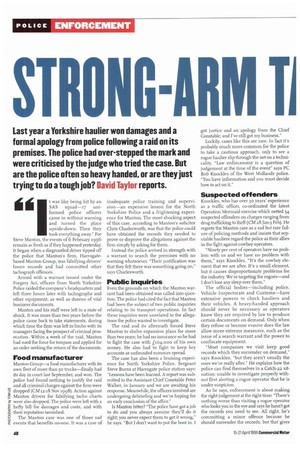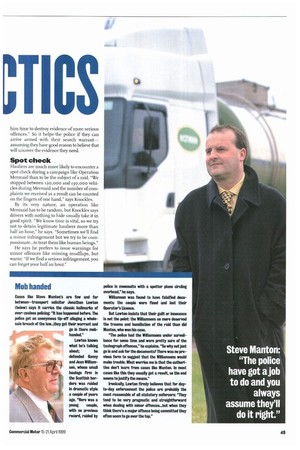STR NC ARM TI
Page 50

Page 51

If you've noticed an error in this article please click here to report it so we can fix it.
Last year a Yorkshire haulier won damages and a formal apology from police following a raid on its premises. The police had over-stepped the mark and were criticised by the judge who tried the case. But are the police often so heavy handed, or are they just trying to do a tough job? David Taylor reports.
t was like being hit by an SAS squad—17 uniformed police officers came in without warning and turned the place upside-down. Then they took everything away." For Steve Manton, the events of 6 February 1996 remain as fresh as if they happened yesterday. It began when a disgruntled driver tipped off the police that Manton's firm, Harrogatebased Manton Group, was falsifying drivers' hours records and had committed other tachograph offences.
Armed with a warrant issued under the Forgery Act, officers from North Yorkshire Police raided the company's headquarters and left three hours later with tachographs and other equipment, as well as dozens of vital business documents.
Manton and his staff were left in a state of shock. It was more than two years before the police came back to take statements, during which time the firm was left in limbo with its managers facing the prospect of criminal prosecution. Within a week of the raid, Manton had sued the force for trespass and applied for an order seeking the return of the documents.
II
Food manufacturer
Manton Group—a food manufacturer with its own fleet of more than 50 trucks—finally had its day in court last September, and won. The police had found nothing to justify the raid and all criminal charges against the firm were dropped (CM iz-r8 Nov 1998). Action against Manton drivers for falsifying tacho charts were also dropped. The police were left with a hefty bill for damages and costs, and with their reputation tarnished.
The Manton case was one of those sad events that benefits no-one. It was a case of inadequate police training and supervision—an expensive lesson for the North Yorkshire Police and a frightening experience for Manton. The most shocking aspect of this case, according to Manton's solicitor Chris Charlesworth, was that the police could have obtained the records they needed to prove or disprove the allegations against the firm simply by asking for them.
Instead the police arrived in strength with a warrant to search the premises with no warning whatsoever. "Their justification was that they felt there was something going on," says Charlesworth.
Public inquiries
Even the grounds on which the Manton warrant had been obtained was called into question. The police had cited the fact that Manton had been the subject of two public inquiries relating to its transport operations. In fact these inquiries were unrelated to the allegations the police wanted to investigate.
The raid and its aftermath forced Steve Manton to shelve expansion plans for more than two years; he had no insurance so he had to fight the case with £104,000 of his own money. He also had to fight to keep key accounts as unfounded rumours spread_ The case has also been a bruising experience for North Yorkshire Police. Sergeant Steve Burns at Harrogate police station says: "Lessons have been learned. A report was submitted to the Assistant Chief Constable Peter Walker, in January and we are awaiting his response. Meanwhile, the officers involved are undergoing debriefing and we're hoping for an early conclusion of the affair."
Is Manton bitter? "The police have got a job to do and you always assume they'll do it right you never expect them to get it wrong," he says. "But I don't want to put the boot in. I got justice and an apology from the Chief Constable; and I've still got my business."
Luckily, cases like this are rare. In fact it's probably much more common for the police to take a cautious approach, only to see a rogue haulier slip through the net on a technicality. "Law enforcement is a question of judgement at the time of the event" says PC Bob Knockles of the West Midlands police. "You have information and you must decide how to act on it."
Suspected offenders
Knockles, who has over 30 years' experience as a traffic officer, co-ordinated the latest Operation Mermaid exercise which netted 54 suspected offenders on charges ranging from drug trafficking to theft (CM 28 Jan-3 Feb). He regrets the Manton case as a sad but rare failure of policing methods and insists that reputable hauliers regard the police as their allies in the fight against cowboy operators.
"Ninety per cent of operators have no problem with us and we have no problem with them," says Knocldes. "It's the cowboy element that we are after. It's a small element, but it causes disproportionate problems for the industry. We're targeting the rogues—and I don't lose any sleep over them."
The official bodies—including police, Vehicle Inspectorate and Customs—have extensive powers to check hauliers and their vehicles. A heavy-handed approach should never be necessary as operators know they are required by law to produce certain documents on demand. Only when they refuse or become evasive does the law allow more extreme measures, such as the issue of a search warrant and the power to confiscate equipment.
"Most companies we visit keep good records which they surrender on demand," says Knockles, "but they aren't usually the ones we're really after." He explains how the police can find themselves in a Catch-22 situation: unable to investigate properly without first alerting a rogue operator that he is under suspicion.
As he says, enforcement is about making the right judgement at the right time: "There's nothing worse than visiting a rogue operator who looks you in the eye and says he hasn't got the records you need to see. All right, he's committing a minor offence because he should surrender the records, but that gives him time to destroy evidence of more serious offences." So it helps the police if they can arrive armed with their search warrant assuming they have good reason to believe that will uncover the evidence they need.
Spot check
Hauliers are much more likely to encounter a spot check during a campaign like Operation Mermaid than to be the subject of a raid. We stopped between 120,000 and 130,000 vehides during Mermaid and the number of complaints we received as a result can be counted on the fingers of one hand," says Knockles.
By its very nature, an operation like Mermaid has to be random, but Knoddes says drivers with nothing to hide usually take it in good spirit. "We know time is vital, so we try not to detain legitimate hauliers more than half an hour," he says. "Sometimes we'll find a minor infringement but we try to be compassionate...to treat them like human beings."
He says he prefers to issue warnings for minor offences like missing mudflaps, but warns: f we find a serious infringement, you can forget your half an hour"












































































































